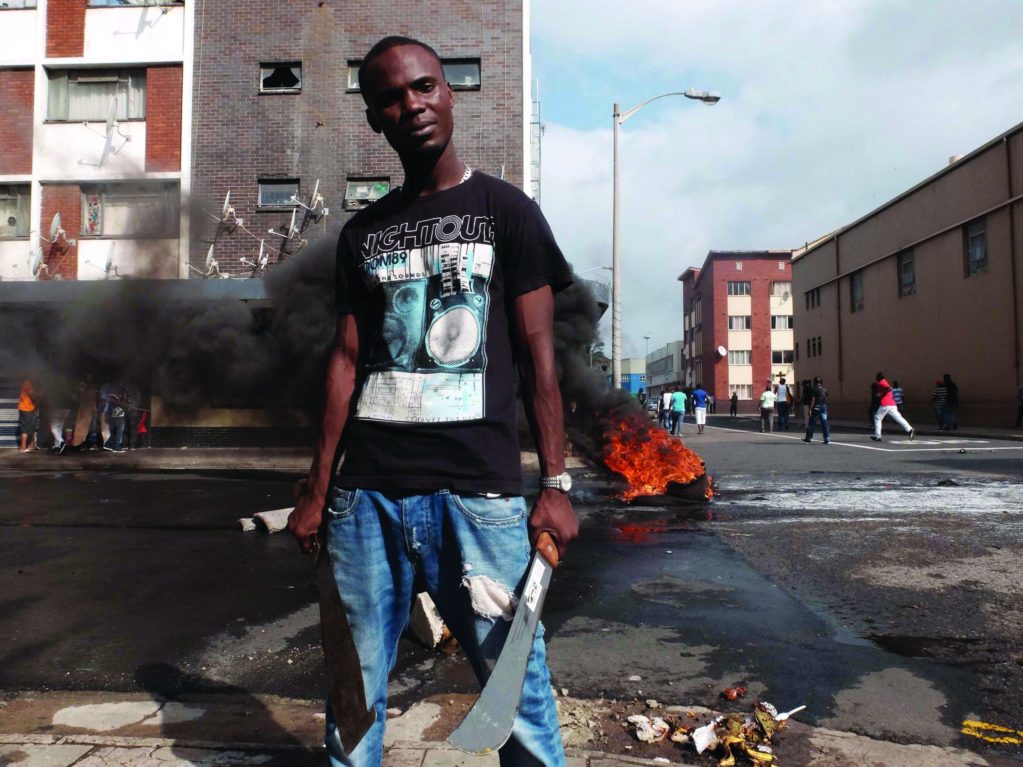Edgar Maculo spent the night at Primrose police station in the east of Johannesburg. He feared for the life of his wife and their 10-month-old baby. He is miles away from his home in Mozambique. Should anything happen to him, his relatives would be forced to transport his remains back home, just like his compatriot, Ernesto Nhamuave, the man who was burned to death in 2008 in the same East Rand region.
He fights back tears when I ask him if the recent events remind him of 2008. Fear is the only thing preventing him from returning to Mozambique, even though South Africa is a place he now calls home.
After the xenophobic attacks almost seven years ago, Africa’s most industrialized economy is yet again battling to exorcize the demon of violence against foreign nationals.
Zulu monarch, King Goodwill Zwelithini, and President Jacob Zuma’s son, Edward, have been blamed for fueling attacks on foreigners with their statements.
“We are requesting those who come from outside to please go back to their countries,” said Zwelithini.
Loading...
“South Africa was too accommodative to foreign nationals unnecessarily,” said Zuma.
Following Zwelithini’s comments, at least five foreigners were killed as South Africans hunted foreigners, looted shops and vandalized property.
The attacks which started in Durban spread to Johannesburg. Police patrolled the streets during a series of standoffs between foreign store owners and attackers.
There are fears this could degenerate into ugly scenes seen in 2010 when images of a Mozambican in flames went all over the world.
Zwelithini blames foreigners for dirty streets and crime.
“There are unsightly goods hanging all over our shops. They dirty our streets. We cannot even recognize which shop is which. They are all blocked by foreigners,” Zwelithini is reported to have said at a meeting in Pongola, northern KwaZulu Natal, at the end of March.
Zwelithini’s comments have been criticized by human rights groups, religious leaders and political activists.
Thousands gathered in Durban to participate in a ‘peace march’ on April 16 in a bid to stop the violence.
Independent human rights organization, Lawyers for Human Rights, condemned the intolerance and blatant disregard for the rights of foreigners in South Africa.
“Most concerning is the use of aggressive measures, including rubber bullets, tear gas and water cannons, by police to disperse the roughly 300 foreign nationals who defied the revocation of their permission to protest against recent xenophobic attacks in the area,” the organization said in a statement.
“Unfortunately, foreign nationals are not given a platform to voice their fears and concerns.”
The rest of Africa has decried the violence.
Nigerians have rebuked South Africa with hashtags on social media and placards at the South African Embassy in Lagos.
“The on-going activity in South Africa is shocking. It is unfortunate that some South Africans are oblivious to the economic contribution foreigners have made to the country over the years,” says Victor Teriba, a lecturer in Lagos.
“These terrible acts have sent shockwaves through the continent and indeed, the rest of the world. To think that foreigners are being maltreated is rather depressing,” says Zainab Maisani, an Abuja resident.
“A lot of South Africans are mortified by the actions of our countrymen towards foreigners and they should be brought to order immediately,” says Xolani Mabaso, a South African living in Nigeria.
Worried Kenyans persistently called friends and family in South Africa to check on them. Many also took to social media to condemn the violence, others simply to vent. The foreign affairs office in Nairobi announced Kenya was ready to evacuate its citizens from South Africa.
Malawi and Somalia started repatriating its countrymen.
President Zuma also condemned the attacks.
“We cannot continue killing one another as Africans who belong to the same continent. What is happening in our country is not acceptable.”
While economists and political analysts say that the xenophobic violence is a symptom of unemployment and inequality in South Africa, some government officials disagreed.
Home Affairs Minister, Malusi Gigaba, blamed a ‘third force’. He claims there are people in the shadows that are bent on destroying South Africa’s image.
“There are people who are behind this and their main aim is to destroy the image of and embarrass South Africa internationally. These people buy the youth drugs and arm them to go on a looting frenzy,” Gigaba said in an interview with radio station Ukhozi FM.
Tens of thousands of foreigners, mostly from other African states and Asia, have moved to South Africa since white-minority rule ended in 1994.
It is estimated that about 4% of the world’s population comprises of diaspora communities, a reality that South Africans should start embracing.
Loading...
